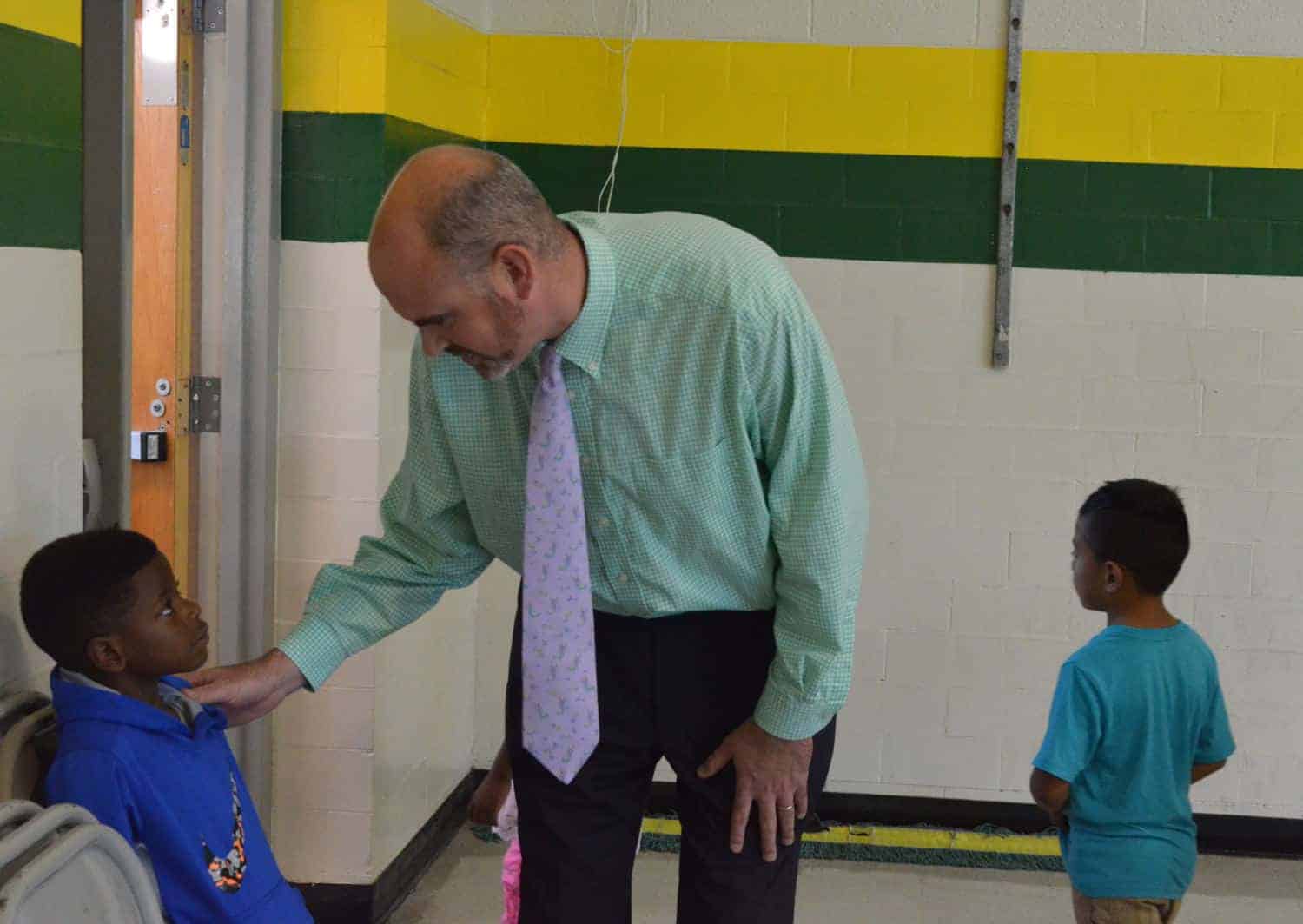Just inside the main doors of Merrick-Moore Elementary School in Durham, an inquisitive first-grader wondered what in the world a reporter could be doing on the grounds after school had let out for the day. The young girl was satisfied with the response that the visit was to interview the school’s principal, Matthew Hunt, about his job.
Seemingly satisfied, the girl launched into an explanation of what led to the pink cast that now swallowed most of her arm. Just as she described it as the result of playground shenanigans gone wrong, Hunt emerged from his office.
“That’s why I love this job,” said Hunt, glancing back at the restless first-grader awaiting pick up.
While Hunt’s interactions with students energize him, his first year at Merrick-Moore Elementary was challenging to say the least. North Carolina gives each of its schools a grade of A, B, C, D, or F, and Merrick-Moore has been receiving Fs for years.
End-of-year test scores determine 80 percent of the grade, and 20 percent is determined by growth: a measurement of student improvement in scores from the beginning of the year to the end. Roughly 80 percent of Merrick-Moore students have failed to pass the state exams each year. “The system is not fair but it is the system,” said Hunt. “We want to be successful.”
In 2015, every school that received an F had a poverty rate of 50 percent or higher. Merrick-Moore had a poverty rate of more than 90 percent.
“We know that our kids can perform, and we know that our kids can accomplish great things; it’s our job to give them the tools,” said Hunt. Teacher retention is one of the school’s biggest problems. At the time he began working at Merrick-Moore, only 41 percent of the staff felt that the school was a good place to work and learn.
Hunt’s main focus in his first year was to improve Merrick-Moore’s teaching and learning environment; based on a mid-year survey in which 96 percent of the staff indicated they would stay at Merrick-Moore next year, he appears to have found some success. Hunt said the key to success is making the teachers feel like their feedback is being taken seriously.
“I hope that I never get amnesia and forget how difficult teaching really is,” said Hunt, a former high school teacher.
The son of two teachers, Hunt knew he was interested in education, but he did not choose to pursue that path right away. After finishing his bachelor’s degree at Williams College in Massachusetts, Hunt played professional basketball in Europe and then moved to Boston where he was an investment banker for three years.
Realizing he was unhappy in the finance world, Hunt’s wife encouraged him to go back to school and get his master’s degree in teaching. Shortly after finishing his master’s of education at Harvard, Hunt and his wife relocated to Durham where they have lived for 12 years.
Hunt began his career in education as a teacher at Northern High School and quickly learned what a challenging field he had chosen. “Playing as a professional basketball player is so much easier than the first year teaching,” said Hunt.
After spending six years at Northern High School, Hunt climbed the administrative ladder. With the advice of his principal at the time, Hunt took an assistant principal position for two years before succeeding his former boss as principal of Northern High School. After 11 years at Northern, Hunt left for Merrick-Moore Elementary.
“There was a combination of factors that led to the transition,” said Hunt. “I absolutely loved my 11 years at Northern as a teacher, coach. and principal. We were proud of the growth over the years, including increased graduation rates, huge drops in suspensions, and the cultivation of a strong school culture led by our students and outstanding teachers. An interest in a new challenge, the great potential of Merrick-Moore, and the desire to spend more time with my family led to the move to Merrick-Moore.”
For Hunt, there is no typical day. Sometimes he spends his days doing classroom evaluations, while others he spends on phone calls with parents and administrators. However, Hunt makes an effort to be present at student arrival every morning, greeting students as they get off the bus and making conversation with them over breakfast.
Hunt’s morning routine is a part of the new reputation he is building for Merrick-Moore. Ultimately, his goal is for parents to feel that their students are attending the best school they can possibly attend.
Merrick-Moore has cut suspensions by two-thirds this year and the administrative team makes a regular effort to make positive phone calls home so parents know when things are going well for their child.
“As a person… he is the most genuine person I’ve ever met. He is extremely intelligent, but I think more so than anything, his genuine nature and his humility drives everything he does,” Assistant Principal Alicia Stevenson said. “He’s one of those people that’s in this for the right reasons and if it’s not about the kids then it doesn’t matter… He will do whatever it takes to see a kid be successful.”
Stevenson was on the administrative team with Hunt at Northern High School and made the move to Merrick-Moore with him. “I don’t think a lot of people understand the gravity of what that means [to be a principal],” said Stevenson. “You have to find a [good] moment every day, or you won’t do it.”
For Hunt, those moments come years after his students leave the school. “I think seeing this cycle of students who go on to accomplish great things and come back to impact our school or the district is just so incredibly rewarding and inspiring, and it just makes you want to do a better job,” Hunt said.
Editor’s Note: Ruijia Zhang contributed reporting.

